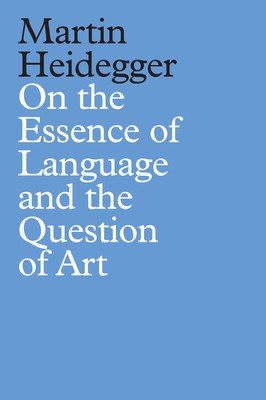
- We will send in 10–14 business days.
- Author: Martin Heidegger
- Publisher: Polity Press
- Year: 2022
- Pages: 200
- ISBN-10: 1509535985
- ISBN-13: 9781509535989
- Format: 15.6 x 23 x 2.2 cm, kieti viršeliai
- Language: English
- SAVE -10% with code: EXTRA
On the Essence of Language and the Question of Art (e-book) (used book) | bookbook.eu
Reviews
Description
The texts and notes collected in this volume offer unique insight into the development of Heidegger's thinking on language and art from the late 1930s to the early 1950s - a tumultuous period both for Heidegger personally and for Germany as a whole. Following Germany's defeat in World War II, Heidegger was banned from teaching at Freiburg University, where he had been a professor since 1928, and his thinking underwent significant changes as he began to cultivate different modes of silence and non-saying in his philosophy of language. This volume illuminates these shifts and charts the evolution of key terms in Heidegger's philosophy of language during this key period in the development of his thought.
The central theme of Heidegger's reflections on language in this volume is his repeated engagement with the character of the word, silence and the unsaid, and his rejection of the instrumental conception of language, where he instead prioritized conversation as the "homeland of language." Alongside references to Hölderlin and von Hofmannsthal and shrewd scrutiny of aural phenomena such as silent thought and speechlessness, speech is demonstrated to be intimately connected to the human essence. In a later section, Heidegger examines the place of art, in particular the plastic arts, and the role of the artist in conjunction with the new industrial landscape and architecture of his time, and in juxtaposition with ancient Greek attitudes to space and the polis.
This key work by Heidegger, now available in English for the first time, will be of great interest to students and scholars of philosophy and to anyone interested in Heidegger's thought.
EXTRA 10 % discount with code: EXTRA
The promotion ends in 23d.05:08:31
The discount code is valid when purchasing from 10 €. Discounts do not stack.
- Author: Martin Heidegger
- Publisher: Polity Press
- Year: 2022
- Pages: 200
- ISBN-10: 1509535985
- ISBN-13: 9781509535989
- Format: 15.6 x 23 x 2.2 cm, kieti viršeliai
- Language: English English
The texts and notes collected in this volume offer unique insight into the development of Heidegger's thinking on language and art from the late 1930s to the early 1950s - a tumultuous period both for Heidegger personally and for Germany as a whole. Following Germany's defeat in World War II, Heidegger was banned from teaching at Freiburg University, where he had been a professor since 1928, and his thinking underwent significant changes as he began to cultivate different modes of silence and non-saying in his philosophy of language. This volume illuminates these shifts and charts the evolution of key terms in Heidegger's philosophy of language during this key period in the development of his thought.
The central theme of Heidegger's reflections on language in this volume is his repeated engagement with the character of the word, silence and the unsaid, and his rejection of the instrumental conception of language, where he instead prioritized conversation as the "homeland of language." Alongside references to Hölderlin and von Hofmannsthal and shrewd scrutiny of aural phenomena such as silent thought and speechlessness, speech is demonstrated to be intimately connected to the human essence. In a later section, Heidegger examines the place of art, in particular the plastic arts, and the role of the artist in conjunction with the new industrial landscape and architecture of his time, and in juxtaposition with ancient Greek attitudes to space and the polis.
This key work by Heidegger, now available in English for the first time, will be of great interest to students and scholars of philosophy and to anyone interested in Heidegger's thought.


Reviews